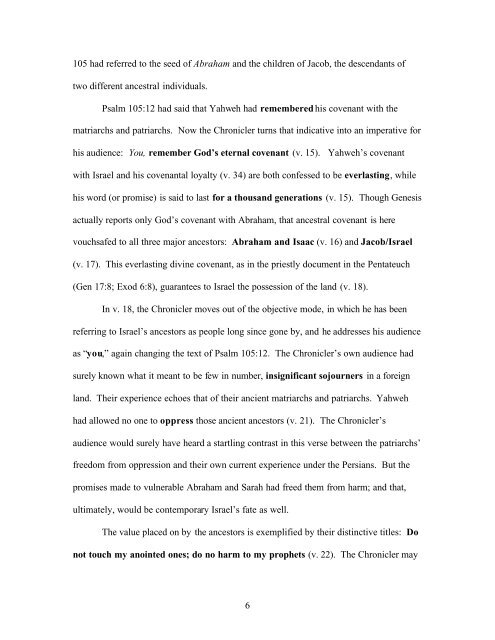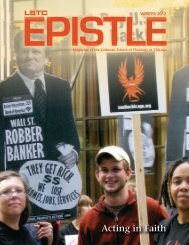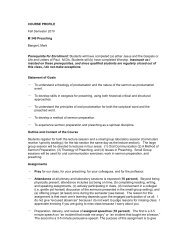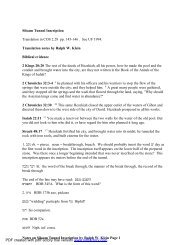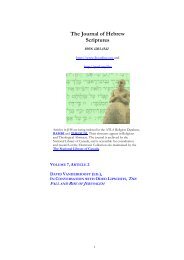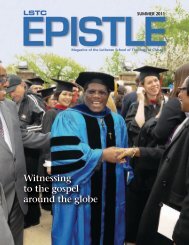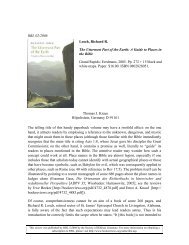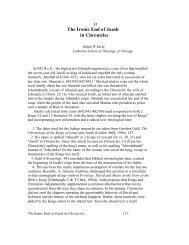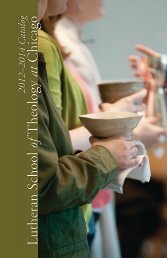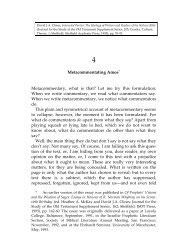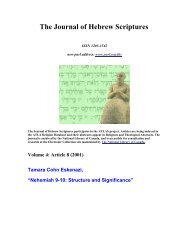1 Psalms in Chronicles Ralph W. Klein May 13, 2004 While we have ...
1 Psalms in Chronicles Ralph W. Klein May 13, 2004 While we have ...
1 Psalms in Chronicles Ralph W. Klein May 13, 2004 While we have ...
You also want an ePaper? Increase the reach of your titles
YUMPU automatically turns print PDFs into web optimized ePapers that Google loves.
105 had referred to the seed of Abraham and the children of Jacob, the descendants oftwo different ancestral <strong>in</strong>dividuals.Psalm 105:12 had said that Yah<strong>we</strong>h had remembered his covenant with thematriarchs and patriarchs. Now the Chronicler turns that <strong>in</strong>dicative <strong>in</strong>to an imperative forhis audience: You, remember God’s eternal covenant (v. 15). Yah<strong>we</strong>h’s covenantwith Israel and his covenantal loyalty (v. 34) are both confessed to be everlast<strong>in</strong>g, whilehis word (or promise) is said to last for a thousand generations (v. 15). Though Genesisactually reports only God’s covenant with Abraham, that ancestral covenant is herevouchsafed to all three major ancestors: Abraham and Isaac (v. 16) and Jacob/Israel(v. 17). This everlast<strong>in</strong>g div<strong>in</strong>e covenant, as <strong>in</strong> the priestly document <strong>in</strong> the Pentateuch(Gen 17:8; Exod 6:8), guarantees to Israel the possession of the land (v. 18).In v. 18, the Chronicler moves out of the objective mode, <strong>in</strong> which he has beenreferr<strong>in</strong>g to Israel’s ancestors as people long s<strong>in</strong>ce gone by, and he addresses his audienceas “you,” aga<strong>in</strong> chang<strong>in</strong>g the text of Psalm 105:12. The Chronicler’s own audience hadsurely known what it meant to be few <strong>in</strong> number, <strong>in</strong>significant sojourners <strong>in</strong> a foreignland. Their experience echoes that of their ancient matriarchs and patriarchs. Yah<strong>we</strong>hhad allo<strong>we</strong>d no one to oppress those ancient ancestors (v. 21). The Chronicler’saudience would surely <strong>have</strong> heard a startl<strong>in</strong>g contrast <strong>in</strong> this verse bet<strong>we</strong>en the patriarchs’freedom from oppression and their own current experience under the Persians. But thepromises made to vulnerable Abraham and Sarah had freed them from harm; and that,ultimately, would be contemporary Israel’s fate as <strong>we</strong>ll.The value placed on by the ancestors is exemplified by their dist<strong>in</strong>ctive titles: Donot touch my ano<strong>in</strong>ted ones; do no harm to my prophets (v. 22). The Chronicler may6


